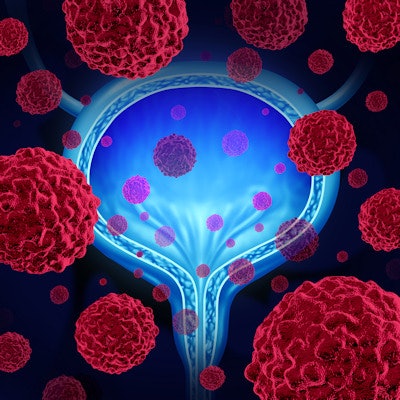
A new therapeutic target has been discovered for metastatic bladder cancer, according to research presented June 26 at the Society of Nuclear Medicine and Molecular Imaging (SNMMI) annual meeting in Chicago.
The target is a cell surface tumor antigen CUB domain-containing protein 1 (CDCP1), noted a team of researchers led by Shalini Chopra, PhD, of the University of California, San Francisco.
Bladder cancer is the second most common malignancy of the genitourinary tract, Chopra and colleagues noted, and it causes more than 17,000 deaths in the U.S. each year.
"Despite recent FDA approvals of bladder cancer therapies, metastatic bladder cancer remains incurable, and new treatment strategies are needed," the SNMMI said in a statement it released about the research.
Chopra and colleagues evaluated the expression of CDCP1 in four bladder cancer datasets that consisted of more than 1,000 biopsies; they tested tumor detection with Zr-89 4A06, a monoclonal antibody that targets CDCP1.
"We know that bladder cancer is molecularly heterogeneous and uniformly fatal," Chopra said. "In this research, we investigated the cell surface protein CDCP1 to see whether it is a viable target for bladder cancer radiopharmaceutical therapy using radiolabeled anti-CDCP1 antibodies."
They found that the protein was expressed in 53% of bladder cancer biopsies with the highest expression in the aggressive basal/squamous subtype.
"These data establish for the first time that CDCP1 is expressed in bladder cancer and introduces a new therapeutic target for this common and deadly malignancy," Chopra said in a statement released by the SNMMI. "CDCP1-directed therapeutics may add to the current standard of care and improve the survival rate of patients with metastatic bladder cancer. As there are not many nuclear medicine treatments available for bladder cancer, we hope that this research can generate excitement among fellow nuclear medicine researchers to explore the disease and fill existing gaps in treatment."





















